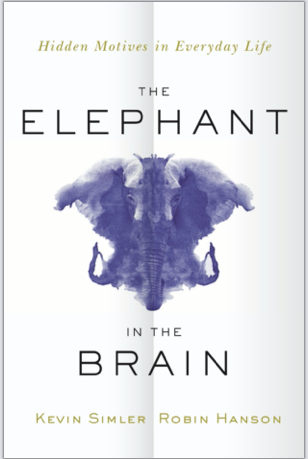The Caveman Social Life version 1.0

My notes on The Elephant in the Brain. It's a deep dive into the foundations of our motivations in modern society to act the way we do base on our ancient social skills in the stone age, caveman society ver. 1.0 alive and well cutting in line at a coffee shop near you.

My French Professor was a keen observer of society, and I think he summed up why people do what appears to be stupid, or horrible, or, if newsworthy, both with a short insightful fact. "It was not so long ago that we were all living in caves." In the life of a trait or a lizard brain twitch from ten thousand years ago, or more is not so long ago for us to be slaves to it while holding a smartphone rather than a sharp stick.
The book covers our blind spots, from how we react to someone cutting in line To turning a blind eye to public drinking if the booze is wrapped in a paper bag to gossip and the social structure of bullying the bully. We don't take notice of the deep roots of our own social queues and species novelties that we happily point out in birds, monkeys, and other observable critters. We should be taking notice. As complex as our daily interactions can be, a little insight can help smooth out conflicts that could easily go very wrong.
Why is your brain so big? If it was to help us follow the social norms, if we always told the truth, didn't speed, or cheat on a test, life would be simple. Our brains would not need to make complex choices. Apparently, the reason to have a bigger brain is to allow us to make up better, more complex lies and not get caught doing it. The simple truth is we are built to lie to ourselves, lie to our friends, lie to our rivals, and lie to our enemies. Our brain has evolved multiple personas to help us keep our lies hidden from other parts of our brains. For example, to lie cleverly as not to get caught securing an unfair advantage in polite society. For example, we might know that a vaccine is a way to fight the Covid-19 pandemic but keep that truth hidden from ourselves for some other reason. Or rail against wearing a mask in public, which would have saved thousands of lives, to gain political clout.
- I have the insight to interject in my notes. Computers will not master human communication for lack of emotions but for an inability to tell complex lies like humans.
- Remember, Mr. Spock was renowned as a Vulcan for his inability to lie. Friends and rivals were often surprised to learn that he did not always tell the truth. However, even Mr. Spock could lie to himself and get away with it.
The introduction ends with the main point and Elephant in the brain that we don't really know why we do what we do. We are not of one mind. However, our brain's function will make up a story to tell people if they ask. They sight a study where a test subject is set up to answer a question or raise an arm. Because of the nature of the experiment, the subject did not know they had been set up. Their brain had no idea it was telling a story. So comically, when asked why the subject took action, the unknowing brain of the subject created a plausible fiction to answer the question. "I stood up ...because I wanted a coke."
The rest of the book covers observations that back up the notion that we do not know ourselves. For example, why do we laugh, make sexual congress, interpret posture and body language?
My takeaway in chapters 5 and 6 was that you could, in a way, know yourself but only by constant self-study or introspection. You have to think about thinking that could be another reason why we have such huge brains. It reminds me of a story about electric cars in Mexico City. To get the all-electric cars to run a whole day, taxi drivers had hooked up portable generators in the back seat to keep the car battery charged as they drive. To have an onboard thought review process, you need to have bigger lobes hooked up in the back seat of your brain.
The rest of the book brings up more examples of how we do things, but we don't know why. Laughing was my favorite. "If you want to tell someone the truth, make them laugh. Otherwise, they will kill you." I see the value of being the court jester who has to tell the king unpleasant news.
And here is the end of my notes. I hope that unhappy news does not dissuade you from enjoying this or any other book I take notes on.
